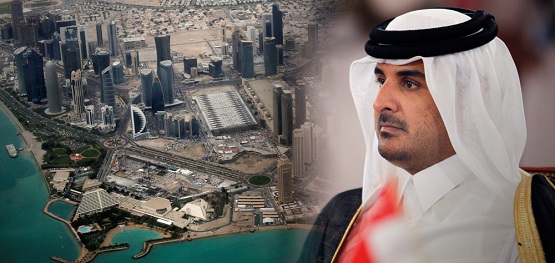As the Qatari diplomatic crisis with the Saudi-led Arab states crosses its first month, a wide range of developments in the two sides' relations continue to take place.
The row started with an all-out Arab blockade over Doha. Mess in Qatar and other Arab countries' stock markets ensued. The boycotting countries - Saudi Arabia, Bahrain, Egypt, and the UAE- sent a list of 13 demands to Doha, with a 10-day deadline to meet them that was rejected by Doha.
What is the solution?
Diplomatic crises in some regions like Africa or East Asia carries slight consequences, but repercussions of a crisis in Persian Gulf region are quite different. One side of the rift is Saudi Arabia, the world's largest oil producer, and on the other side stands Qatar, the world's largest LNG exporter. Other involved sides are majorly allies to the US in the region. Other parties like Russia and Turkey also seek to make the most out of the ongoing crisis between the members of (Persian) Gulf Cooperation Council (PGCC).
The two sides of the row stepped in a course thats continuation means further escalation of tensions, augmented economic and political costs, and even risks of direct military engagement. Any party's backing down on its postures will also come highly costly.
If the opposite sides will not decide to retreat from their stances in favor of de-escalation and the US takes Saudi Arabian side, not only the chances of end of the crisis will disappear but also it will head to more complicated corners.
Compounded differences will bring about negative ramifications to the two sides. They will result in destroyed chances of convergence, inefficiency of the Arab League and the (Persian) Gulf Cooperation Council, and growing distrust among the Arab states amid an urgency to face an array of regional challenges. Other consequences include Qatar moving towards the Saudi rivals, the economic damages due to falling trade exchanges, risks of investment, and reduced tourism incomes.
On the other side, any party's retreat, as it happens under pressures, will be understood by the other party as a loss and thus heavily damaging to its credibility.
The inflexible and excessive positions of the boycotting countries beside their "irrational" demands will double their credibility costs once they decide to back down, something making it hard for Saudi Arabia and other allied states to move back from their anti-Qatari measures. Qatar, on the opposite side, poses as an oppressed and rightful party and so finds no reason to show flexibility in front of the Saudi-led camp.
Generally, the more pressure the blockading countries put on Qatar by toughening the sanctions, the more resistance Doha will show. This dual stubbornness will drive the situation to more costs for both sides.
Another possible development could be one side's call on the United Nations Security Council to address the crisis, something paving the way for direct Russian or American intervention in the Persian Gulf row as both hold Security Council's permanent seats and thus the right of veto. The analysts note that the US could deter possible UNSC moves to defuse the crisis, eagerly fuel the crisis, or even stay out of the game. The possible US decision to leave the row unfolding will direct the situation to intensification.
If the tensions continue rolling on, one worst option for Qatar could be military confrontation, though the experts see it highly unlikely. If Qatar is to resort to military confrontation, it will need to ask the US for help according to its 1992 and 2014 security agreements with Washington. But the US will sure not take Qatar's side.
But this does not mean Qatar options are restricted. Even if it declines to draw support from the UNSC or the US, it could head to Russia for backing. In this case, presence of the American military bases on the Qatari territories will no longer make sense in the eyes of the Doha officials.
Saudi Arabia's attempt to inflame the crisis should not be underestimated as Riyadh sees no obligation to make deal with Doha and so will continue pressing until success in changing Qatar behavior. The Saudi foreign ministry repeatedly said that it had no intention for direct talks with Qatar for de-escalation.
Perhaps the most complicated part of the current situation is the influence of the crisis on the future of the Cooperation Council, as the tense conditions send no signals of easy and short-term solution. Since the eruption of the Persian Gulf diplomatic row, the UNSC has failed to release a resolution.
So far, both sides showed stiff standing on their positions, ruining prospects of step-by-step settlement to the struggle, or at least lifting the Qatari blockade. Doha leaders reiterated the need for dialogue-based solution to the crisis, but the Saudis intentionally took steps to compound the crisis and close the doors to any final solution.
The Riyadh intentions were apparent in its list of 13 demands sent to Doha. Odds are that in next steps Saudi Arabia along with the UAE will suspend Qatar's (P )GCC membership or even expel it from the six-nation bloc in a bid to deepen Doha isolation. Each of these measures will certainly worsen the crisis.
LINK: https://www.ansarpress.com/english/7500
TAGS:































 Violation of the sovereignty and rights of afghan citizens by America
Violation of the sovereignty and rights of afghan citizens by America




